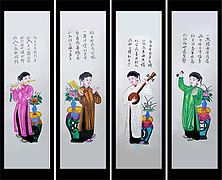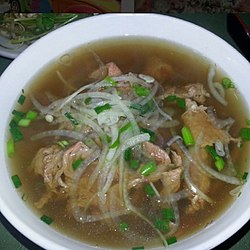
Back Gastronomía de Vietnam AST Vyetnam mətbəxi Azerbaijani Lutong Vietnamese BCL В’етнамская кухня Byelorussian Виетнамска кухня Bulgarian ভিয়েতনামী রন্ধনশৈলী Bengali/Bangla Gastronomia del Vietnam Catalan Vietnamská kuchyně Czech Det vietnamesiske køkken Danish Vietnamesische Küche German
| Part of a series on the |
| Culture of Vietnam |
|---|
 |
| History |
| People |
| Languages |
| Cuisine |
| Festivals |
| Music |
| Sport |
This article needs additional citations for verification. (January 2013) |



Vietnamese cuisine encompasses the foods and beverages originated from Vietnam. Meals feature a combination of five fundamental tastes (ngũ vị): sweet, salty, bitter, sour, and spicy. The distinctive nature of each dish reflects one or more elements (such as nutrients and colors), which are also based around a five-pronged philosophy. Vietnamese recipes use ingredients like lemongrass, ginger, mint, Vietnamese mint, long coriander, Saigon cinnamon, bird's eye chili, lime, and Thai basil leaves.[1] Traditional Vietnamese cooking has often been characterised as using fresh ingredients, not using much dairy or oil, having interesting textures, and making use of herbs and vegetables. The cuisine is also low in sugar and is almost always naturally gluten-free, as many of the dishes are rice-based instead of wheat-based, made with rice noodles, rice papers and rice flour.[2]
- ^ "Vietnamese Ingredients". WokMe. 2011. Retrieved 2 December 2011.
- ^ "Healthy Eating: Seven Reasons Why You Should Start Eating Vietnamese Food". HuffPost. 23 April 2014.